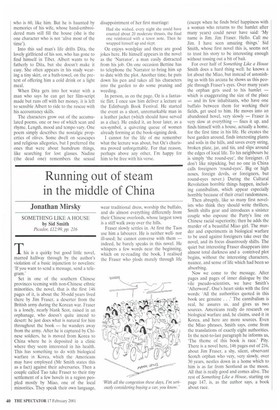Running out of steam in the middle of China
Jonathan Mirsky
SOMETHING LIKE A HOUSE by Sid Smith
Picador, ,f12.99, pp. 216
This is a quirky but good little novel, marred halfway through by the author's violation of a basic injunction to novelists: 'If you want to send a message, send a telegram.'
Set in one of the southern Chinese provinces teeming with non-Chinese ethnic minorities, the novel, that is the first 146 pages of it, is about the 30-odd years lived there by Jim Fraser, a deserter from the British army during the Korean war. Fraser is a lonely, nearly blank Scot, raised in an orphanage, who doesn't quite intend to desert: he just does what is natural for him throughout the book — he wanders away from the army. After he is captured by Chinese soldiers, he is moved from Korea to China where he is deposited in a clinic where they seem interested in his health. This has something to do with biological warfare in Korea, which the Americans may have employed (Mr Smith states this as a fact) against their adversaries. Then a couple called Tao take Fraser to their tiny settlement of a few hovels in a region peopled mostly by Miao, one of the local minorities. They speak their own language, wear traditional dress, worship the buffalo, and do almost everything differently from their Chinese overlords, whose largest town is a stiff walk away over the hills.
Fraser slowly settles in. At first the Taos use him a labourer. He is neither wellnor ill-used; he cannot converse with them — indeed, he barely speaks in this novel. He whispers a few words near the beginning, which on re-reading the book, I realised the Fraser who plods mutely through life
(except when he finds brief happiness with a woman who returns to the hamlet after many years) could never have said: 'My name is Jim. Jim Fraser. Hello. Call me Jim. I have seen amazing things.' Sid Smith, whose first novel this is, seems not to trust his story to be interesting enough without tossing out a bit of bait.
For over half of Something Like a House Smith does a hard thing well: he knows a lot about the Miao, but instead of astonishing us with his arcana he shows us this people through Fraser's eyes. Over many years the orphan gets used to his hamlet — which is exaggerating the size of the place — and its few inhabitants, who have one buffalo between them for working their fields, get used to him. He moves into an abandoned hovel, very slowly — Fraser is very slow at everything — fixes it up, and finds himself with a house, actually a home, for the first time in his life. He creates the best garden around, finds interesting plants and soils in the hills, and saves every string, broken plate, jar, and tin, and slips around the edges of local life. To his neighbours he is simply 'the round-eye', the foreigner. (I don't like nitpicking, but no one in China calls foreigners 'round-eyes'. Big or high noses, foreign devils, or foreigners, but round-eyes never.) During the Cultural Revolution horrible things happen, including cannibalism, which appear especially horrible because of their cruel randomness.
Then abruptly, like so many first novelists who think they should write thrillers, Smith shifts gear and introduces a sinister couple who espouse the Party's line on Chinese racial superiority; then he adds the murder of a beautiful Miao girl. The murder and experiments in biological warfare to be used against foreigners take over the novel, and its focus disastrously shifts. The quiet but interesting Fraser disappears into almost total darkness and a contrived plot begins, without the interesting characters, nuance, and sense of life which had been so absorbing.
Now we come to the message. After pages and pages of inner dialogue by the vile pseudo-scientists, we have Smith's 'Afterword'. One's heart sinks with the first words: 'All the authorities quoted in this book are genuine . . .' The cannibalism is real, he assures us, and gives us two sources. Americans really do research on biological warfare and, he claims, used it in Korea, and here are more sources. Even the Miao phrases, Smith says, come from the translations of exactly eight authorities. In the next-to-last paragraph he informs us, 'The theme of this book is race.' Pity. There is a novel here, 146 pages out of 216, about Jim Fraser, a shy, silent, observant Scotch orphan who very, very slowly, over 30 years, nestles down in a home which to him is as far from Scotland as the moon. All that is really good and comes alive. The rest of Something Like a House, starting on page 147, is, as the author says, a book about race.


































































 Previous page
Previous page